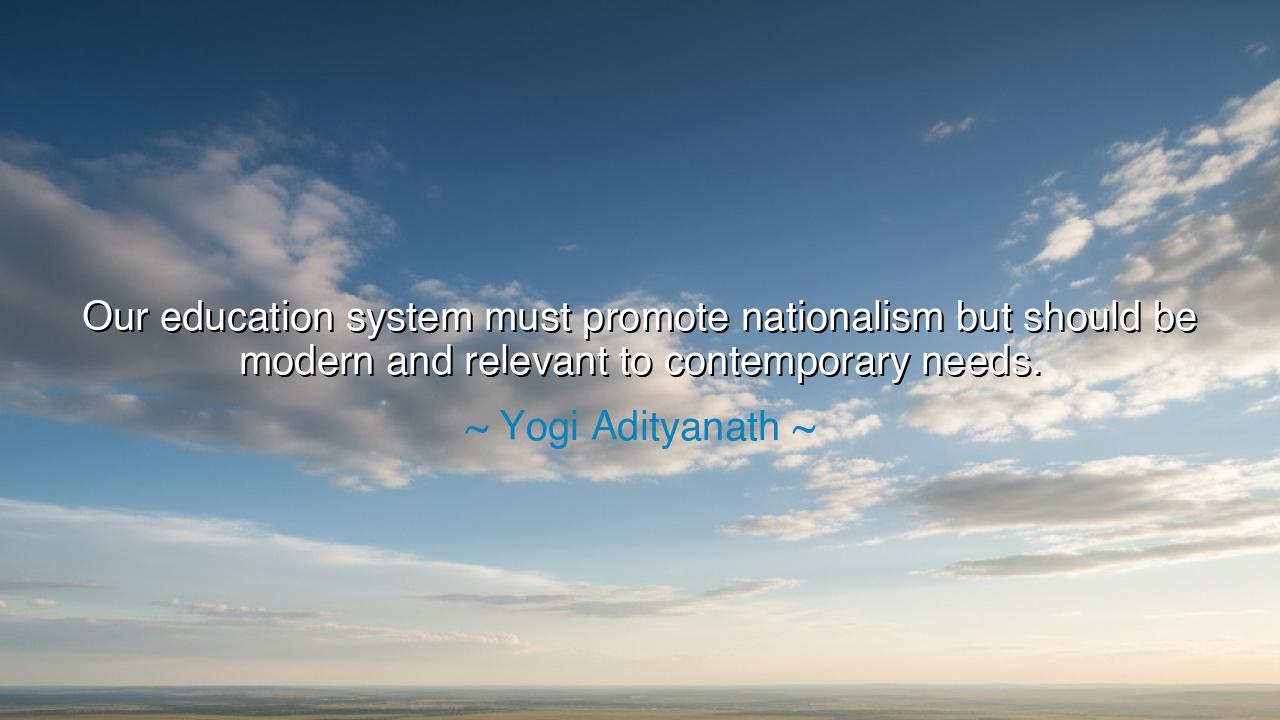
Our education system must promote nationalism but should be
Our education system must promote nationalism but should be modern and relevant to contemporary needs.






The words of Yogi Adityanath—“Our education system must promote nationalism but should be modern and relevant to contemporary needs.”—strike with the force of both tradition and vision. They remind us that education is not a neutral vessel but a torch, and what flame it carries determines the path of the nation. To promote nationalism is to root the young in love for their land, their culture, their people; to make them remember that they are not drifting leaves, but branches of a mighty tree with deep roots. Yet, Adityanath does not stop there: he demands also that education be modern and relevant, lest it trap the future in the chains of the past. His words bring forth a union of heritage and progress, a balance as vital as breath itself.
To speak of nationalism in education is to speak of identity. A people who forget their stories, their heroes, their sacrifices, soon lose their strength. Nations rise not only on wealth or armies, but on shared spirit. From the earliest days, societies taught their children the myths, scriptures, and epics that bound them together: the Greeks recited Homer, the Indians passed down the Mahabharata, the Hebrews taught the Torah. In all these, education was a vessel of national soul. Adityanath’s call is to preserve this essence—that every child must grow with knowledge of who they are, and of the soil from which they spring.
Yet, to cling only to the past is to grow stagnant. Hence the call for modern relevance. The world of today is not the world of our ancestors: technology advances, economies shift, ideas cross oceans. If education speaks only of tradition but ignores science, innovation, and contemporary skills, it cripples the young. Adityanath’s vision insists that education must be twofold: one hand holding the wisdom of tradition, the other grasping the tools of modern life. This is no contradiction—it is harmony, for a tree must have both deep roots and branches that reach the sky.
History itself provides an example of this principle in the life of Japan during the Meiji Restoration. In the late 19th century, Japan realized that survival against colonial powers required both modern science and a strong national identity. They embraced railroads, factories, and Western medicine, but also rooted their education in loyalty to the Emperor and reverence for their heritage. The result was a nation that modernized rapidly, yet did not lose its soul. This mirrors the balance that Adityanath’s words seek: a nationalism that strengthens, a modernity that empowers.
On the other hand, we see cautionary tales where one side was ignored. Nations that embraced modernity but abandoned identity became hollow, unable to inspire unity. Others that clung only to tradition, rejecting progress, were left behind in poverty and weakness. The wisdom of Adityanath’s teaching is that both are needed—pride in nation and relevance to the age—lest education fail in its highest purpose.
The lesson for us all is clear: cultivate an education that teaches you to stand tall in the world as a modern being, yet bow your head in gratitude to your ancestors. Learn the skills of today—science, technology, communication—but anchor them in values of loyalty, service, and love for your land. In this way, you will not be rootless wanderers, but citizens who carry both the fire of innovation and the light of heritage.
So, O listener, remember Adityanath’s words. Let your education be the meeting place of past and present. Let it remind you that to serve your nation is noble, but to serve it wisely, with modern tools and relevant skills, is greater still. Carry both the wisdom of your ancestors and the knowledge of your age, and you will be builders not only of prosperity but of destiny. For a nation whose children learn both pride and progress shall never falter, but will stand firm as a beacon through the storms of time.






AAdministratorAdministrator
Welcome, honored guests. Please leave a comment, we will respond soon